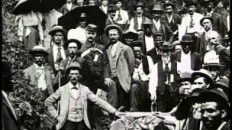Actes 3:19-22 Repent ye therefore, and be converted, that your sins may be blotted out, when the times of refreshing shall come from the presence of the Lord; And he shall send Jesus Christ, which before was preached unto you: Whom the heaven must receive until the times of restitution of all things, which God hath spoken by the mouth of all his holy prophets since the world began.
The history of the papacy, the office held by the pope as head of the Catholic Church, according to Catholic doctrine, spans from the time of Peter to the present day.
During the Early Church, the bishops of Rome enjoyed no temporal power until the time of Constantine. After the Fall of the Western Roman Empire (the “Middle Ages”, about 476), the papacy was influenced by the temporal rulers of the surrounding Italian Peninsula; these periods are known as the Ostrogothic Papacy, Byzantine Papacy, and Frankish Papacy. Over time, the papacy consolidated its territorial claims to a portion of the peninsula known as the Papal States. Thereafter, the role of neighboring sovereigns was replaced by powerful Roman families during the saeculum obscurum, the Crescentii era, and the Tusculan Papacy.
From 1048 to 1257, the papacy experienced increasing conflict with the leaders and churches of the Holy Roman Empire and the Byzantine Empire (Eastern Roman Empire). The latter culminated in the East–West Schism, dividing the Western Church and Eastern Church. From 1257–1377, the pope, though the bishop of Rome, resided in Viterbo, Orvieto, and Perugia, and then Avignon. The return of the popes to Rome after the Avignon Papacy was followed by the Western Schism: the division of the western church between two and, for a time, three competing papal claimants. Read More.
KJV
























